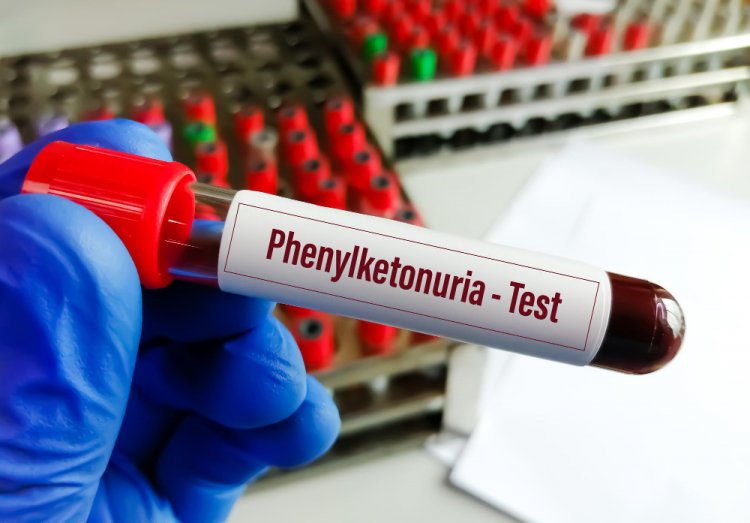Phenylketonuria (PKU)
Phenylketonuria (PKU) is a rare inherited metabolic disorder characterized by the body's inability to properly metabolize the amino acid phenylalanine. This condition stems from a deficiency in the enzyme phenylalanine hydroxylase, which is necessary for breaking down phenylalanine into other compounds. Without this enzyme, phenylalanine accumulates in the body to toxic levels, leading to various health complications.

Causes
PKU is caused by mutations in the gene that encodes the phenylalanine hydroxylase enzyme. These mutations disrupt the enzyme's normal function, impairing the conversion of phenylalanine into tyrosine. PKU follows an autosomal recessive pattern of inheritance, meaning that an individual must inherit two copies of the defective gene (one from each parent) to develop the disorder.
Symptoms
Symptoms of PKU can manifest shortly after birth and may include:
- Intellectual disability
- Delayed development
- Behavioral problems
- Seizures
- Hyperactivity
- Skin rashes
- A musty odor in the breath, skin, or urine
The severity of symptoms can vary widely among affected individuals, depending on the degree of enzyme deficiency and the level of phenylalanine accumulation.
Diagnosis
Newborn screening programs are instrumental in detecting PKU early. These screenings involve testing a small blood sample from a newborn's heel to measure phenylalanine levels. Elevated phenylalanine levels in the blood prompt further diagnostic testing, including genetic testing and a phenylalanine tolerance test, to confirm the diagnosis.
Treatment
Management of PKU primarily revolves around strict dietary control to limit phenylalanine intake while ensuring adequate nutrition. This typically involves a specialized diet low in phenylalanine, supplemented with medical formulas containing essential nutrients and low levels of phenylalanine. Regular monitoring of blood phenylalanine levels is essential to adjust dietary restrictions as needed.
In some cases, individuals with PKU may benefit from medication such as sapropterin dihydrochloride (Kuvan), which can help reduce phenylalanine levels by enhancing the activity of residual phenylalanine hydroxylase enzyme.
Complications
Untreated PKU can result in severe neurological complications, including profound intellectual disability, developmental delays, seizures, and behavioral issues. However, early diagnosis and strict adherence to treatment protocols can mitigate these risks and allow affected individuals to lead fulfilling lives with normal cognitive development.
In conclusion, Phenylketonuria is a genetic disorder that disrupts phenylalanine metabolism, leading to toxic levels of phenylalanine in the body. While PKU has no cure, early detection through newborn screening and lifelong management with dietary restrictions and, in some cases, medication can effectively control phenylalanine levels and prevent associated complications. Close monitoring by healthcare professionals is crucial for optimizing treatment outcomes and ensuring the well-being of individuals with PKU.
#Phenylketonuria #PKU #GeneticDisorder #MetabolicDisorder #Healthcare #RareDisease #MedicalResearch #NewbornScreening #DietaryControl #HealthManagement #NeurologicalComplications #MedicalTreatment #HealthAwareness #PKUawareness #HealthEducation #MedicalScience #GeneticMutations #HealthcareProfessionals #MedicalDiagnosis #MedicalGenetics #EarlyDetection #HealthMonitoring #MedicalSupport #PatientCare #MedicalAwareness #HealthComplications #NeurologicalHealth #MedicalTherapy #MedicalGuidance
Disclaimer:
The information provided in this article is for educational purposes only and should not be considered medical advice. If you have any health concerns or are experiencing symptoms, it is important to consult with a healthcare professional, such as a doctor or clinic, for proper diagnosis and treatment. Always seek the advice of your doctor or other qualified health provider with any questions you may have regarding a medical condition. Do not disregard professional medical advice or delay in seeking it because of something you have read in this article.
What's Your Reaction?





















